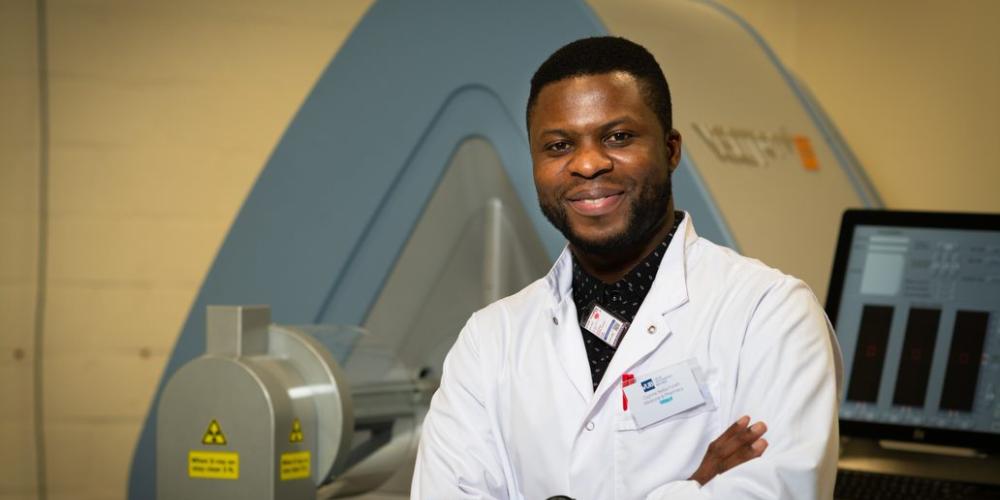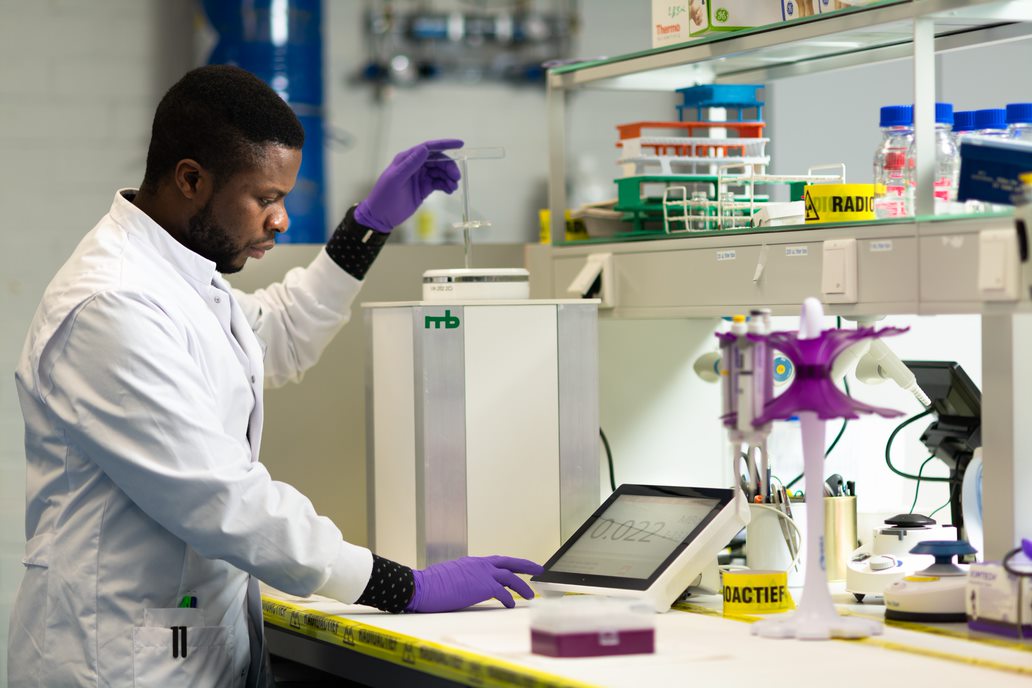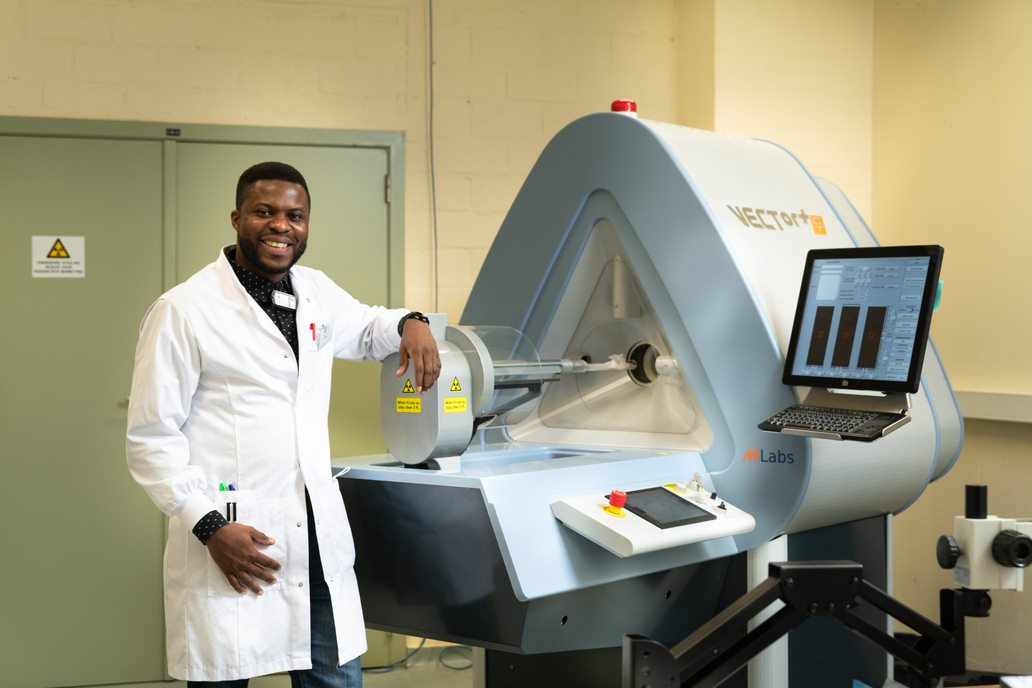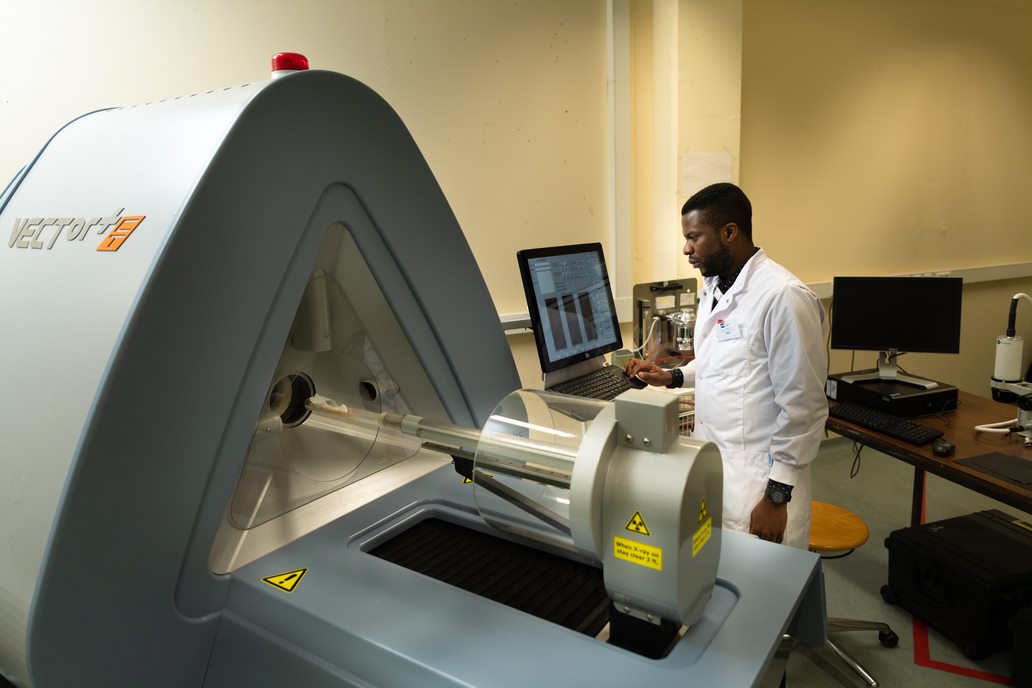
VUB alumnus Cyprine Neba Funeh wants to use the knowledge he’s gaining as a phd student in Belgium to help cancer patients in Cameroon and beyond
“I am not here by chance,” laughs Cyprine Neba Funeh. Here, in his case, is the Vrije Universiteit Brussel, where he’s been working since 2021 as a molecular biologist in the Medical Imaging lab on the VUB Health Campus in Jette with a grant from the FWO. At secondary school in Cameroon, Belgium was not even a distant dream for Cyprine. Back then, he was already dreaming about cloning, an interest that didn’t go unnoticed by his biology teacher, who had spotted his student’s talent and drive.
Photo's © VUB / Thierry Geenen
“After secondary school, I went to the University of Buea in Cameroon to get a degree in clinical laboratory sciences,” says Cyprine. “I graduated in 2014. Normally, I would also do my master’s in Cameroon, but I found that I couldn’t go deep enough into my interests there, and Cameroon couldn’t offer me either the expertise or the opportunities I thought I needed to really dive into applied research. So I had to go abroad.”
From Cameroon to Belgium
Between dream and reality, practical constraints sometimes stand in the way. In Cyprian’s case, these were mainly financial. “Before I could actually start studying abroad, I had to work. I started working in a polyclinic in Bamenda, Cameroon, and saved all my money to make living abroad possible. In the meantime, I’d researched the options for an affordable and high-quality study programme in Europe and soon found the molecular biology master’s at VUB. I worked in the hospital lab in Cameroon for four years. During that time, I met many patients with metastatic cancers; I also saw cases of cancer in my family and decided I wanted to do further research on that.”
“I wanted to look for other ways to help fight cancer and contribute to research.” - Cyprine Neba Funeh
In October 2018, Cyprine left his native soil behind, boarded a plane and arrived in Brussels. There he obtained his master’s degree with distinction in June 2021. “I already had the idea then that I wanted to go further in my research, that I wanted to look for other ways to help fight cancer and thus contribute to research.
"Spurred on by my professors, Nick Devoogdt and Matthias D’Huyvetter, and by Dr Ahmet Krasniqi, who was my direct supervisor, I applied for an FWO grant with the research theme ‘Development of a molecule targeting a pan-cancer antigen for imaging and targeted radionuclide therapy of cancer’, a grant which I was fortunately awarded. And now I’m carrying out that research at VUB, in the Medical Imaging lab (MIMA) in Jette.”
Continue reading below the picture.
Targetting cancer cells
Cyprine’s research focuses on the development of molecules that can help eliminate cancer cells in addition to standard therapies such as chemotherapy, radiotherapy and surgery.
“A surgeon can remove a tumour surgically,” says Cyprine, “but sometimes they cannot avoid leaving cancer cells in the tissue. These are then hopefully destroyed by chemotherapy. If these cells are not destroyed, they can give rise to metastases, which can lead to secondary cancers or cause remission. With my research, I hope to develop a therapy that can be administered intravenously, where the active molecules I make find their way through the bloodstream to the cancer cells in the body and eliminate them. In the first instance, they can support traditional therapy. The problem with chemotherapy is that it is very taxing on the patient’s body and in some respects even toxic. The more we can replace or reduce chemo with additional targeted therapies, the better.”
Continue reading below the picture. “The more we can replace or reduce chemo with additional targeted therapies, the better.” - Cyprine Neba Funeh
“The more we can replace or reduce chemo with additional targeted therapies, the better.” - Cyprine Neba Funeh
The active molecules that Cyprine has been working on have the potential to be used in an estimated 20 different cancers and could represent another breakthrough in advancing cancer research. As befits a scientist, Cyprine wants to spread his knowledge as widely as possible after his research.
“I hope that, through cooperation with my homeland, people in Cameroon and far beyond can also benefit from the knowledge gained through my research. I would like to continue doing research after completing my doctoral studies, possibly in industry or at a research institute.”
Continue reading below the picture.
 “I hope that, through cooperation with my homeland, people in Cameroon and far beyond can also benefit from my knowledge.” - Cyprine Neba Funeh
“I hope that, through cooperation with my homeland, people in Cameroon and far beyond can also benefit from my knowledge.” - Cyprine Neba Funeh
Home from home
Cyprine has taken Belgium to his heart. “I don’t have any family here, but I do have a lot of friends, including from Cameroon, but it’s mainly a colourful international crowd, with Belgians too, of course. I feel this country is like a home from home. In Cameroon they speak two languages, here three, so the countries have to deal with similar issues. Moreover, I don’t have to miss Cameroon entirely: in Brussels you can find everything that you can find in shops in Cameroon. I regularly eat the same here as I did in Africa."
“Above all, I feel a great sense of gratitude for the opportunities I am being given here, for the support from the multidisciplinary team that’s guiding my research, from my colleagues in the lab, for the help I get from my promotors and professors. And not forgetting the opportunities that VUB and the FWO have given me, because they have been able to make my dreams very real. I would also like to thank my professor Anna Njunda from the Faculty of Health Sciences at the University of Buea.”
VUB's fight against cancer
VUB is an Urban Engaged University that is firmly committed to the fight against cancer through scientific research. Scientists from various fields – medicine, bioengineering, pharmacy, physiotherapy, psychology – work together on an interdisciplinary basis. Fundamental and clinical scientific research into cancer go hand in hand, which is why the UZ Brussel, VUB’s university hospital, is an important partner in research, therapy and care. More awareness about cancer is needed for its prevention and cure, while more awareness about scientific research benefits the search for remedies and patient well-being. VUB is therefore grateful for an initiative such as World Cancer Day on 4 February.